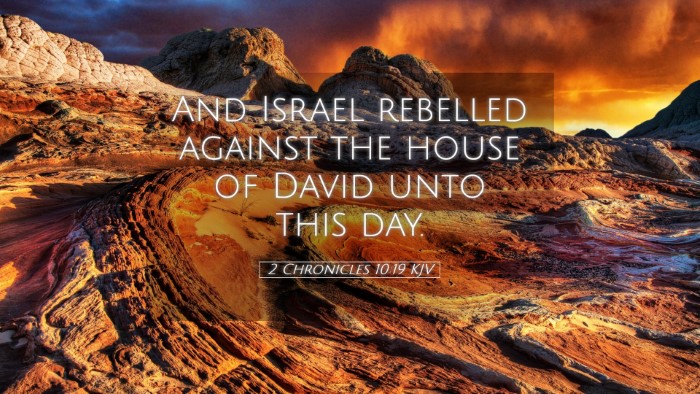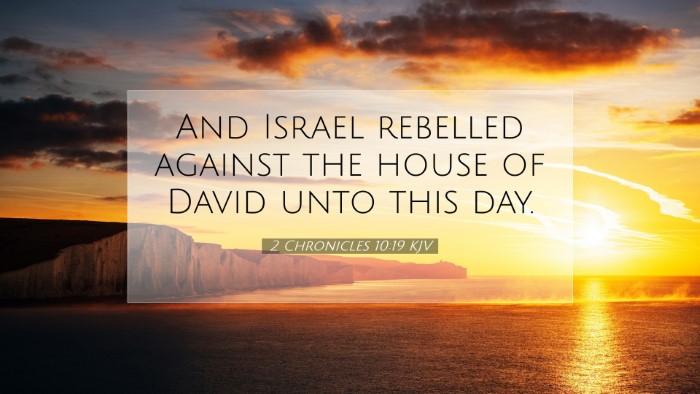Commentary on 2 Chronicles 10:19
Verse: "And Israel rebelled against the house of David unto this day." (2 Chronicles 10:19)
Introduction
This passage marks a pivotal moment in the history of ancient Israel, highlighting the deep-seated divisions that arose after King Solomon's reign. The rebellion against the house of David sets a course that leads to the division of Israel into the northern and southern kingdoms. The commentaries provided by Matthew Henry, Albert Barnes, and Adam Clarke offer numerous theological and historical insights into this significant event.
Historical Context
The history of Israel's monarchy was characterized by political and spiritual conflicts. Following the death of Solomon, his son Rehoboam ascended the throne. This transition was crucial; it was a test of leadership and wisdom, ultimately leading to the division of the kingdom. Past commentaries deeply analyze the decisions made by Rehoboam and the implications of those decisions.
Insights from Matthew Henry
Matthew Henry emphasizes the immediate context surrounding the tragic decision of the Israelites to reject Rehoboam. He notes that the people approached Rehoboam asking for lighter burdens, contrasting their previous service under Solomon. This request symbolizes a broader desire for relief from oppressive governance.
Henry argues that Rehoboam's failure to seek wise counsel, particularly from the older advisors who had served Solomon faithfully, demonstrates the perils of youthful arrogance and impetuousness. Instead, he opts for advice from his peers, leading to an inflexible and harsh response that incites the rebellion.
Albert Barnes' Commentary
Albert Barnes provides a theological lens through which to view the rebellion. He points out that the rejection of Rehoboam was not merely a political stance; it was also symbolic of a deeper spiritual rebellion against God’s appointed leadership. Barnes posits that the divided kingdom reflects the fulfillment of God's judgment and prophecy concerning the sins of Solomon and the impending division of Israel.
He also highlights that the phrase "unto this day" indicates the lasting implications of the rebellion—a fracture that not only affected the immediate generations but resonated throughout Israel’s history, producing consequences that echoed in the historical narrative of the Old Testament.
Adam Clarke's Interpretation
Adam Clarke delves into the nature of rebellion itself and how it has been manifested throughout Israel’s history. He expresses that this act of rebellion was not unexpected, as prior prophecies have foretold of strife within the house of David. Clarke draws a parallel between this historical moment and the perpetual state of division that exists when leaders fail to heed the wisdom of God and the cries of the people.
Clarke’s analysis sheds light on the psychological dynamics within the nation—how discontent can prickle beneath the surface until ignited by mismanagement or insensitivity from leadership. His commentary ultimately serves as a cautionary tale for contemporary leaders, stressing the importance of humility, receptiveness to counsel, and the necessity of seeking divine guidance in governance.
Theological Themes
- Leadership and Governance: The significance of leadership choices plays a central role in this narrative. The failure of Rehoboam to make prudent decisions exemplifies how critical leadership is to the unity and well-being of a community.
- Divine Sovereignty: The division that ensues can be understood as part of God's sovereign plan, where human rebellion and divine judgment intersect to bring about His purposes in history.
- Rebellion Against God: The rejection of Rehoboam signifies a broader rejection of God’s authority, exemplified throughout scriptural history and pertinent to contemporary reflection on spiritual fidelity.
Practical Applications
For pastors and church leaders, this passage serves as a reminder of the importance of wise counsel and the humility needed to lead effectively. Encouraging congregations to voice their concerns and ensuring that leadership remains accountable are essential steps in fostering healthy church dynamics.
Students and scholars examining this scripture are invited to reflect on the historical implications of leadership as both a caution and guide; it is a reminder that the choices made by those in authority can provoke deep divisions, whether in the church, community, or broader societal contexts.
Conclusion
2 Chronicles 10:19 encapsulates a moment of significant transition that resonates with the themes of leadership, rebellion, and divine judgement. The combined insights from ancient commentators enrich our understanding of this complex narrative, prompting continued reflection on the vital intersection of human decision-making and God's overarching will in the unfolding history of His people.


